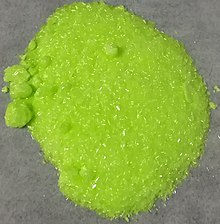Praseodymium(III) acetate
 | |
| Names | |
|---|---|
| IUPAC names
Tetra-μ2-acetatodiaquadipraseodymium(III)
praseodymium (3+) triacetate
| |
| Other names
Praseodymium ethanoate
| |
| Identifiers | |
3D model (JSmol)
|
|
| ChEBI | |
| ChemSpider | |
| ECHA InfoCard | 100.025.676 |
| EC Number |
|
PubChem CID
|
|
CompTox Dashboard (EPA)
|
|
| |
| |
| Properties | |
| Pr(O2C2H3)3 | |
| Appearance | Green solid |
| Hazards | |
| GHS labelling:[1] | |

| |
| Warning | |
| H315, H319, H335 | |
| P261, P264, P264+P265, P271, P280, P302+P352, P304+P340, P305+P351+P338, P319, P321, P332+P317, P337+P317, P362+P364, P403+P233, P405, P501 | |
Except where otherwise noted, data are given for materials in their standard state (at 25 °C [77 °F], 100 kPa).
| |
Praseodymium(III) acetate is an inorganic salt composed of a Praseodymium atom trication and three acetate groups as anions. This compound commonly forms the dihydrate, Pr(O2C2H3)3·2H2O.[2]
Preparation
[edit]Praseodymium(III) acetate can be formed by the reaction of acetic acid and praseodymium(III) oxide:[3]
Praseodymium(III) carbonate and praseodymium(III) hydroxide can also be used:
- ↑
Structure
[edit]According to X-ray crystallography, anhydrous praseodymium acetate is a coordination polymer. Each Pr(III) center is nine-coordinate, with two bidentate acetate ligands and the remaining sites occupied by oxygens provided by bridging acetate ligands. The lanthanum and holmium compounds are isostructural.[4]
Decomposition
[edit]When the dihydrate is heated, it decomposes to the anhydrous, which then decomposes into praseodymium(III) oxyacetate(PrO(O2C2H3)) then to praseodymium(III) oxycarbonate, and at last to praseodymium(III) oxide.[2]
See also
[edit]References
[edit]- ^ "Praseodymium(3+) acetate". pubchem.ncbi.nlm.nih.gov. Retrieved 30 March 2022.
- ^ a b Nakata, Kazuaki; Hiroo, Katsu; Takagi, Yoshito (1996). "Crystal Structures of Intermediate Products Appearing on the Way of Thermal Decomposition of Praseodymium (III) Acetate Dihydrate by X-ray Powder Diffraction". Bulletin of Osaka Kyoiku University Division III: Natural Sciences. 44 (2). Osaka Kyoiku University: 153–162. ISSN 0373-7411.
- ^ Hall, L. C.; Flanigan, D. A. (Dec 1, 1963). "Polarography of Lanthanum(III), Praseodymium(III), and Ytterbium(III) in Anhydrous Ethylenediamine". Analytical Chemistry. 35 (13). American Chemical Society (ACS): 2108–2112. doi:10.1021/ac60206a036. ISSN 0003-2700.
- ^ Lossin, Adalbert; Meyer, Gerd (1994). "Pr(CH3COO)3, ein wasserfreies Selten-Erd-Acetat mit Netzwerkstruktur". Zeitschrift für Anorganische und Allgemeine Chemie. 620 (3). doi:10.1002/zaac.19946200306.



